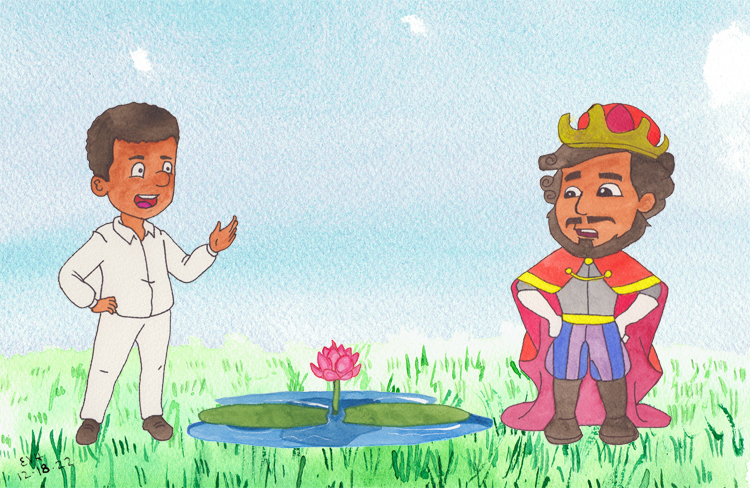
Jataka 396
Kukku Jātaka
the Cubit
as told by Eric Van Horn
originally translated by H.T. Francis and R.A. Neil, Cambridge University
originally edited by Professor Edward Byles Cowell, Cambridge University
In this story the Bodhisatta uses several similes to teach an unrighteous King the importance of virtue. In the first simile, he uses the image of a ridge beam and rafters. This simile is used to teach that in a roof, and in a kingdom, everyone is dependent on everyone else or the structure collapses. In the second simile, he uses the image of a citrus fruit—presumably something like an orange—to teach that only a wise person knows how to eat the fruit properly by removing the outer skin and eating only the pulp. And finally, he uses the image of a lotus in a pond to show that the virtuous person rises above and is not touched by the water below.
“The peak’s a cubit.” The Master told this story while he was living at Jetavana. It is about the rebuke of a king. The occasion will appear in the Tesakuṇa Birth (Jātaka 521).
Once upon a time, when Brahmadatta was reigning in Benares, the Bodhisatta was his councilor in things worldly and spiritual. The King behaved in a dishonorable way. He ruled his kingdom unrighteously. He accumulated wealth by oppressing the people. The Bodhisatta wanted to find a way to admonish him.
Now the King’s bedchamber was unfinished and the roof had not yet been completed. The rafters supported the ridge beam but were only just set in position. The King went off to enjoy himself in the park. When he returned to his house, he looked up and saw the roof. Fearing it would fall on him, he stood on the outside. Then looking up again he thought, “How is that beam remaining in place? And how are the rafters staying in place?” And asking the Bodhisatta, he spoke the first stanza:
The peak’s a cubit and a half in height,
Eight spans will compass it in circuit round,
Of simsapa and sāra built aright.
Why does it stand so sound?
(The simsapa and sāra are types of trees.)
Hearing him the Bodhisatta thought, “I now have a parable with which to admonish the King.” And he spoke these stanzas:
The thirty rafters bent, of sāra wood,
Set equally, encompass it around,
They press it tightly, for their hold is good,
‘Tis set aright and sound.
So is the wise man, held by faithful friends,
By steadfast counsellors and pure,
Never from height of fortune he descends,
As rafters hold the peak secure.
While the Bodhisatta was speaking, the King reflected on his conduct. He said, “If there is no beam, the rafters do not stand fast. The beam does not stand if not held by the rafters. If the rafters break, the ridge beam falls. And even so a bad king—not holding together his friends and ministers, his armies, his brahmins and householders—if these break up, he is not held by them and falls from power. A king must be righteous.”
At that instant they brought the King a citrus fruit as a present. The King said to the Bodhisatta, “Friend, eat this fruit.” The Bodhisatta took it and said, “O King, people who do not know how to eat this make it bitter or acidic. But wise people know how take away the bitter, and without removing the acid or spoiling the citrus flavor, they eat it.” And with this parable, he showed the King how to accumulate wealth, and he spoke two stanzas:
The rough-skinned citrus bitter is to eat,
If it remain untouched by carver’s steel.
Take but the pulp, O King, and it is sweet.
You spoil the sweetness if you add the peel.
Even so the wise man without violence,
Gathers king’s dues in village and in town,
Increases wealth, and yet gives no offence.
He walks the way of right and of renown.
The King—reflecting on the Bodhisatta’s counsel—went to a lotus tank. There he saw a lotus in flower. And with a hue like the newly risen sun, not defiled by the water, he said, “Friend, that lotus growing in the water stands undefiled by the water.” Then the Bodhisatta said, “O King, so should a king be.” And he spoke these stanzas in admonition:
Like the lotus in the pool,
White roots, waters pure, sustain it.
In the sun’s face flowering full,
Dust nor mud nor wet can stain it.
So the man whom virtues rule,
Meek and pure and good we style him.
Like the lotus in the pool
Defilements can never stain him.

Figure: “Like the lotus in the pool…”
The King—acknowledging the Bodhisatta’s admonition—ruled his kingdom righteously from then on. And doing good deeds, charity and the rest, he became destined for heaven.
After the lesson, the Master taught the Four Noble Truths. Then he identified the birth: “At that time the Ānanda was the King, and I was the wise minister.”
